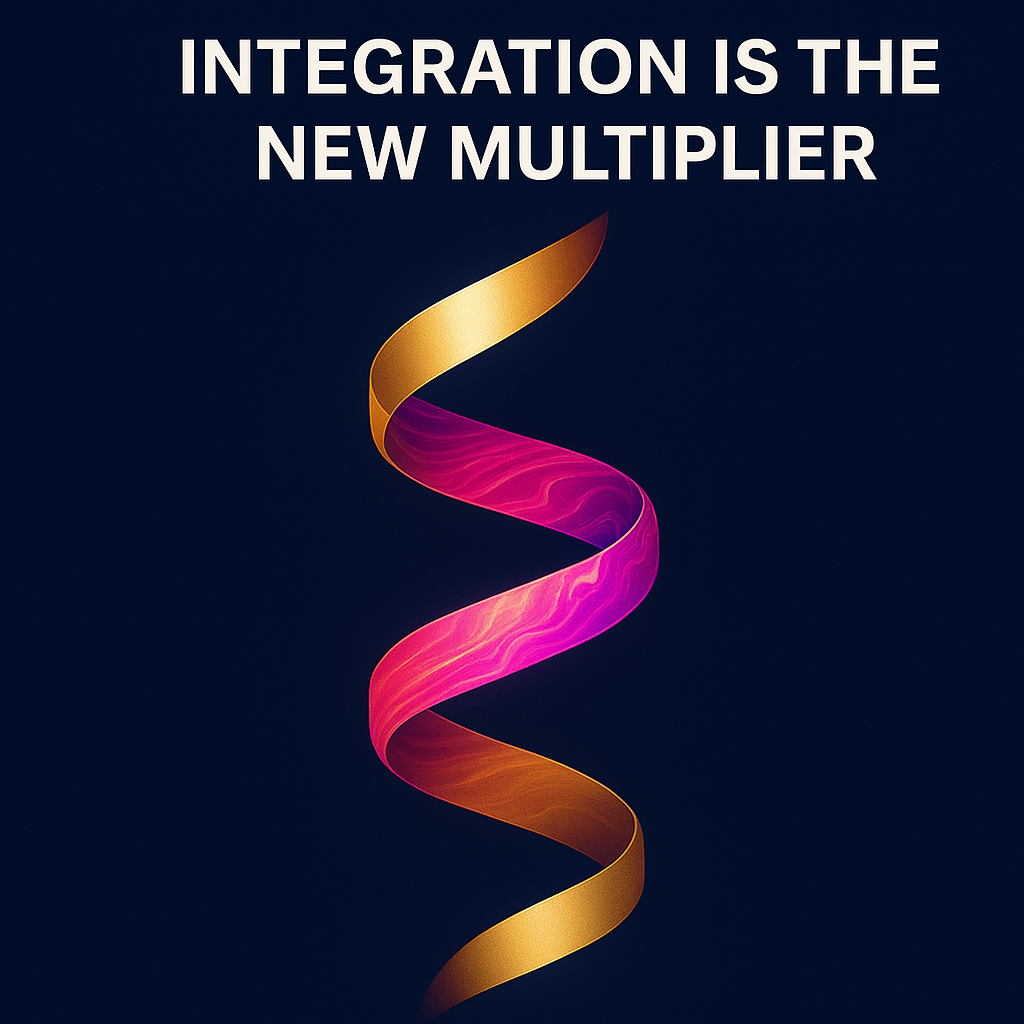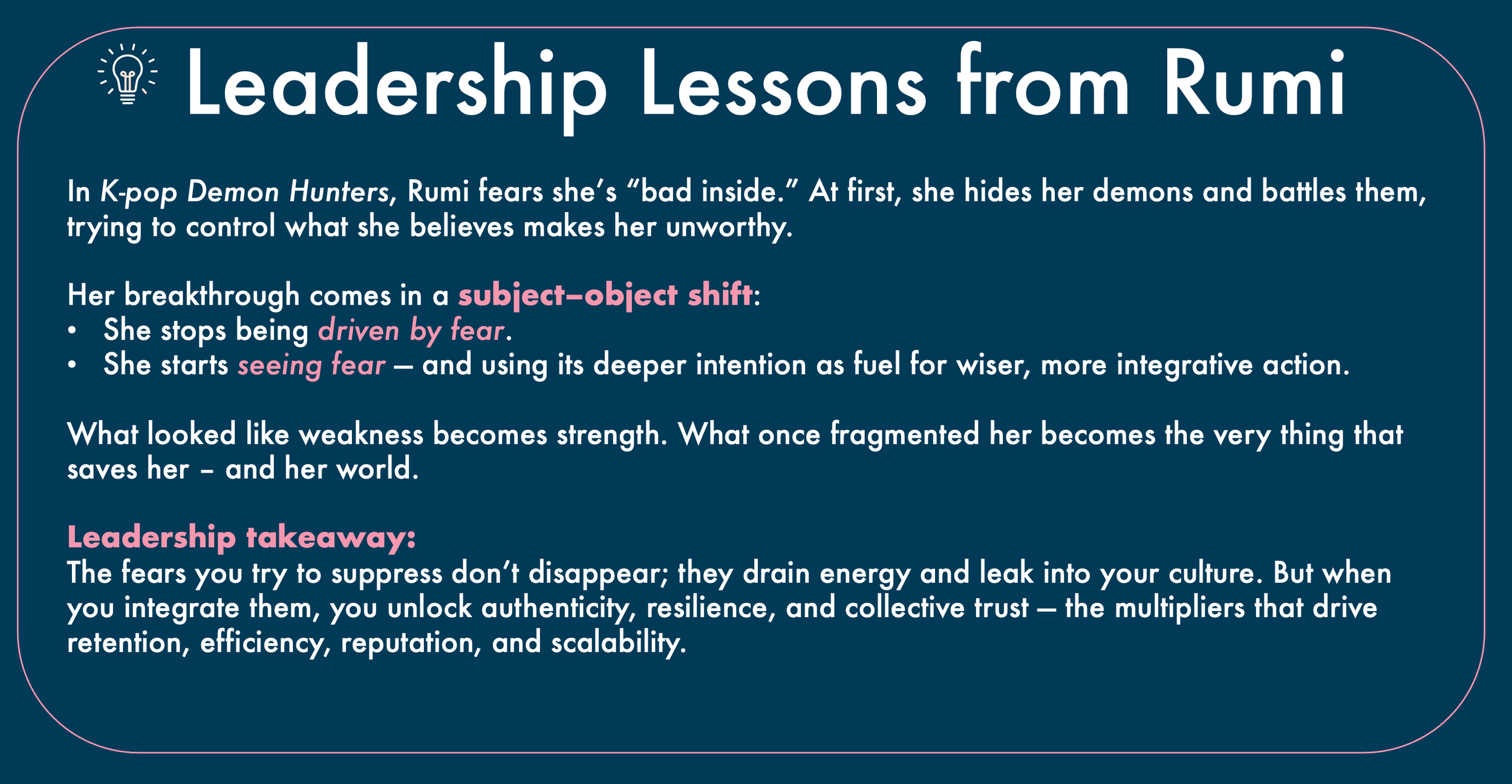No More Golden Idols: Leadership ROI Starts Within
by Judit Teichert
Integration is the new multiplier
It’s not every day that a K-pop blockbuster and Harvard Business Review article feel like they’re speaking the same language on leadership. But K-pop Demon Hunters might be the best crash course in self-transformation that is organically followed by scaled results you’ll see this year.
Leadership’s New Frontier: Beyond Control
In today’s business landscape, leadership effectiveness has become the ultimate multiplier. Strategy, technical mastery, and operational excellence can deliver incremental gains, but they don‘t change the game. What separates organizations that thrive from those that stumble isn’t just better plans – it’s deeper managers and executives.
And here’s the shift: managers and executives can no longer rely on control. Challenges have become too complex for one heroic figure at the top to solve them alone. As Ron Heifetz (Adaptive Leadership) states, systemic challenges demand adaptive, participatory approaches. We need to scale leadership – get all hands on deck, engage distributed intelligence, and collectively problem-solve.
I recently coached a CEO who illustrates this shift vividly. For years, he protected himself from feeling vulnerable. His 360 assessment (Leadership Circle Profile) painted a clear picture: seen as distant, excellent at execution, but over-reliant on control. He worked out solutions by himself – and his colleagues noted that many solutions might have been stronger if he had invited more perspectives.
In coaching, we worked (hard, and uncomfortably) on his fears: fears of being “found out,” disrespected for mistakes, not being the smartest voice in the room. Slowly, he began experimenting with participative, more vulnerable approaches. And sure enough, trust deepened, openness emerged, retention grew and the business itself benefited from improved collective problem-solving.
That’s the shift: scaling leadership by scaling self-awareness.
A Demon Every Leader Knows
For all the titles, KPIs, and boardroom polish, many people still wrestle with a deeply human fear:
“What if I’m not enough? What if something in me is broken, flawed, unworthy?”
The usual responses are predictable – suppress the fear, mask it with confidence, or overcompensate by working harder, being more critical, and pushing others harder.
But the costs are high. Suppressed fears leak into the system: into burnout, strained relationships, eroded trust, and talent attrition. Managers end up expending enormous energy maintaining the mask rather than mobilizing collective brilliance. And when executives and managers hide their own demons, the organization inherits them: silos, groupthink, distrust.
From Fear’s Grip to Fear’s Gift: A K-pop Case Study
Enter K-pop Demon Hunters. The heroine of this viral hit believes there’s something dangerous, imperfect, and unworthy inside her – a demonic pattern she must either fight or hide.
At first, she does what many managers and executives do: conceals (literally!) the parts she fears others will reject, and doubles down on control. But the turning point comes in a subtle and powerful shift.
She moves from being driven, held, and controlled by fear…
→ to using the fear’s gift – its intention, its core value – as fuel for wiser, more integrative, more strategic leadership moves.
This is the classic subject–object shift. Fear stops being the lens through which she sees the world and which shapes her actions but instead becomes something she can hold, examine, and transform into connection, wisdom, and effective leadership.
Integration means no longer exiling or hiding the parts of yourself you’re afraid of, but instead bringing them into awareness, accepting their presence, and learning to use the energy behind them in service of more effective leadership.
By integrating what she once feared, she doesn’t just save herself. She saves the world.
ROI: Why Integration Pays Off
That same shift delivers extraordinary ROI for managers, executives, and their enterprises. Integration means you stop hiding or suppressing the parts of yourself you fear, and instead bring them into awareness, accept them, and channel their energy into wiser action. When you practice integration, the ripple effects are measurable:
Retention: Authentic leadership builds trust. Replacing a high-level executive can cost up to 3x their salary – integration pays for itself.
Efficiency: Energy once wasted on hiding and posturing is freed for strategy and innovation. Even a 10% lift in efficiency in a $500M enterprise equates to $50M in value creation.
Culture & Reputation: Integration at the top seeds cultures of authenticity across the organization. Cultures like this attract top talent, build reputations, and strengthen partnerships. Organizations with high-trust cultures outperform others by up to 50%.
Scalability: Resilient, integrated leaders create the conditions for leadership capacity to spread across the enterprise. This is how collective intelligence scales.
Integration isn’t soft. It’s one of the hardest-edged business levers we have.
The Science and the Holding Environment
Harvard Business Review has rightly emphasized resilience, authenticity, and psychological safety in leadership. But psychological safety is mistakenly often flattened into “being nice and feeling comfortable.”
In truth, as Tim O’Brien, one of KONU’s founders, emphasizes: leadership is about creating a holding environment – strong enough to support courageous moves, safe enough for boldness, harvesting learning and growth.
Amy Edmondson’s research shows that teams in such environments take more risks, innovate more boldly, and grow faster. Managers and executives who embrace their own fears create this holding environment for others. By daring to integrate instead of suppress, they invite their teams to venture beyond comfort zones, innovate at their growth edges, and transform not only themselves but the organization and its mission.
The result: Organizations that adapt faster, innovate more sustainably, and generate lasting impact.
A Personal Note: Integrating “Mom-Me”
Just a few days ago, I watched K-pop Demon Hunters with my kids.
And it reminded me how I often second-guess about bringing “mom-me” into professional contexts. There’s a reflexive impulse to hide that role, as if it might dilute credibility or weaken reputation in the eyes of peers and clients – especially as a woman. „Mom is soft, soft doesn’t help with being taken seriously, being taken seriously is what counts.“ my demon whispers.
But sitting with my boys, watching this story of inner demons and integration unfold, I realized that separating “professional-me” from “mom-me” is its own kind of suppression. And like all suppression, it shrinks leadership.
So here’s me practicing what I preach: integrating “mom-me” and “professional-me.” It feels humbling and a little nervy to share, but it makes me (just like all the other parent-managers out there) more effective in exercising leadership.
And just as integrating “mom-me” expands my own capacity, integrating hidden selves across an enterprise expands its collective leadership effectiveness.
From Inner Game to Outer Impact
The lesson from K-pop Demon Hunters is clear. Transformation begins within. Executives who integrate their fears expand their capacity — for empathy, for strategy, for results, for uncertainty, for resilience.
Expanded capacity translates into measurable ROI: higher retention, improved efficiency, stronger reputations, scalable results. In short: a culture capable of meeting complexity head-on.
The inner game is the multiplier for the outer game. Or put more simply: develop your inner world, and you can develop your outer one too.
How to go from here
The world doesn’t need executives who fight or hide their demons. It needs people who can integrate them.
Integration means no longer exiling the parts of yourself you fear, but bringing them into awareness, accepting their presence, and using their energy to fuel more authentic, courageous leadership. When managers and executives do this, the impact doesn’t stop with them — it rolemodels effective leadership and cascades across teams, cultures, and enterprises.
At KONU, this is the heart of our work: equipping you to turn what you’ve been taught to hide into your greatest multiplier. If that’s the transformation you’re seeking, let’s talk.
So if you’ve been chasing and hiding your demons, maybe it’s time to invite them to the table instead.


